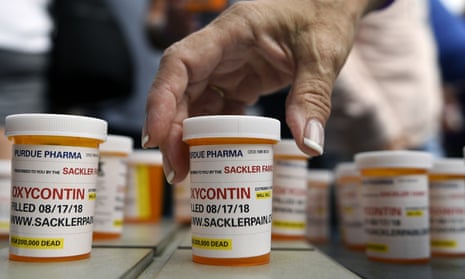Nearly half of US states have joined growing opposition to a highly unusual bankruptcy plan that would protect the wealth of the Sackler family after it made billions of dollars from selling the drug that kickstarted the US opioid epidemic.
Attorneys general of 24 states, members of Congress, municipalities and victims’ families object to the proposal for the Sacklers to forfeit ownership of Purdue Pharma, the manufacturer of the powerful prescription painkiller OxyContin, and surrender part of their immense fortune in return for immunity from further litigation over their part in a drug epidemic that has claimed more than 500,000 lives.
A federal judge in New York, who has already expressed sympathy for the plan, will decide after a hearing on Wednesday whether the Sacklers have made the necessary financial disclosures for it to advance toward the final stage.
Criticism has centered on the unusual proposition to shield the wealth of individual Sacklers, even though they are seeking bankruptcy only for their company and not for themselves.
Under the proposals, the two branches of the Sackler family that own Purdue Pharma would settle more than 3,000 lawsuits against the company by paying $4.3bn. But the Sacklers would keep about $7bn, which would be personally protected from legal action over the part played by some family members in the illegal drive to mass-market OxyContin, for which Purdue has been twice convicted of criminal charges, in 2007 and last year.
State attorneys general called the proposed settlement “unjust” in a brief to the court, because it is intended to sidestep individual accountability. They also questioned its legality.
Massachusetts attorney general, Maura Healey, told National Public Radio: “The bankruptcy system should not be allowed to shield non-bankrupt billionaires.
“It would set a terrible precedent. If the Sacklers are allowed to use bankruptcy to escape the consequences of their actions. It would be a roadmap for other powerful bad actors.”
The US justice department has also raised objections on the grounds that the court is overstepping its authority in extending broad immunity to the Sacklers when they are not themselves applying for bankruptcy.
Critics have accused what one member of Congress called the “most evil family in America” of seeking to buy its way out of accountability, while failing to admit the part played by Purdue Pharma in creating the opioid epidemic with an unprecedented marketing drive to sell OxyContin built on manipulated data and false claims that the drug federal agents called “heroin in a pill” had a low risk of causing addiction.
Purdue used its wealth to influence politicians and regulators to keep the floodgates open, even as the evidence grew of an epidemic in the making.
Lawyers for states and municipalities say that the billions of dollars retained by the Sacklers under the plan would go a long way to provide social services for children left orphaned or forced into foster homes by their parents’ opioid addiction, and to offset the financial burden caused by the epidemic on healthcare and policing.
Documents released by a congressional committee last month show that the family is worth about $11bn. The Sacklers’ assets include nearly $1bn in cash, with billions more held in trusts. Their vast holdings also include art and property.
The family’s lawyers say the $4.3bn payment is fair because it is more than the Sacklers made from OxyContin after tax. It is not clear where the balance of the family’s wealth came from given that the drug was the primary source of Purdue’s profits. Lawyers suing the Sacklers have suggested that a large part of the difference was made up by earnings from investing the proceeds of OxyContin and so should be counted as profits from the drug.
Healey is in the midst of an investigation of the part played by individual members of the family after identifying eight of them she claims knew that OxyContin was causing overdose deaths but kept pushing sales of the drug. They include Dr Richard Sackler, who as Purdue’s head of marketing ramped up sales of OxyContin and painted people who overdosed on the drug as criminals to blame for their own condition.
While the Sacklers have expressed regret for the crisis, they have continued to deny wrongdoing. Kathe Sackler, a former member of Purdue’s board, drew scorn at a congressional hearing in December when she said that while “my “heart breaks for the parents who have lost their children”, the company was not at fault.
“There’s nothing that I can find that I would have done differently,” she said.
Chris McGreal is the author of American Overdose, The Opioid Tragedy in Three Acts
